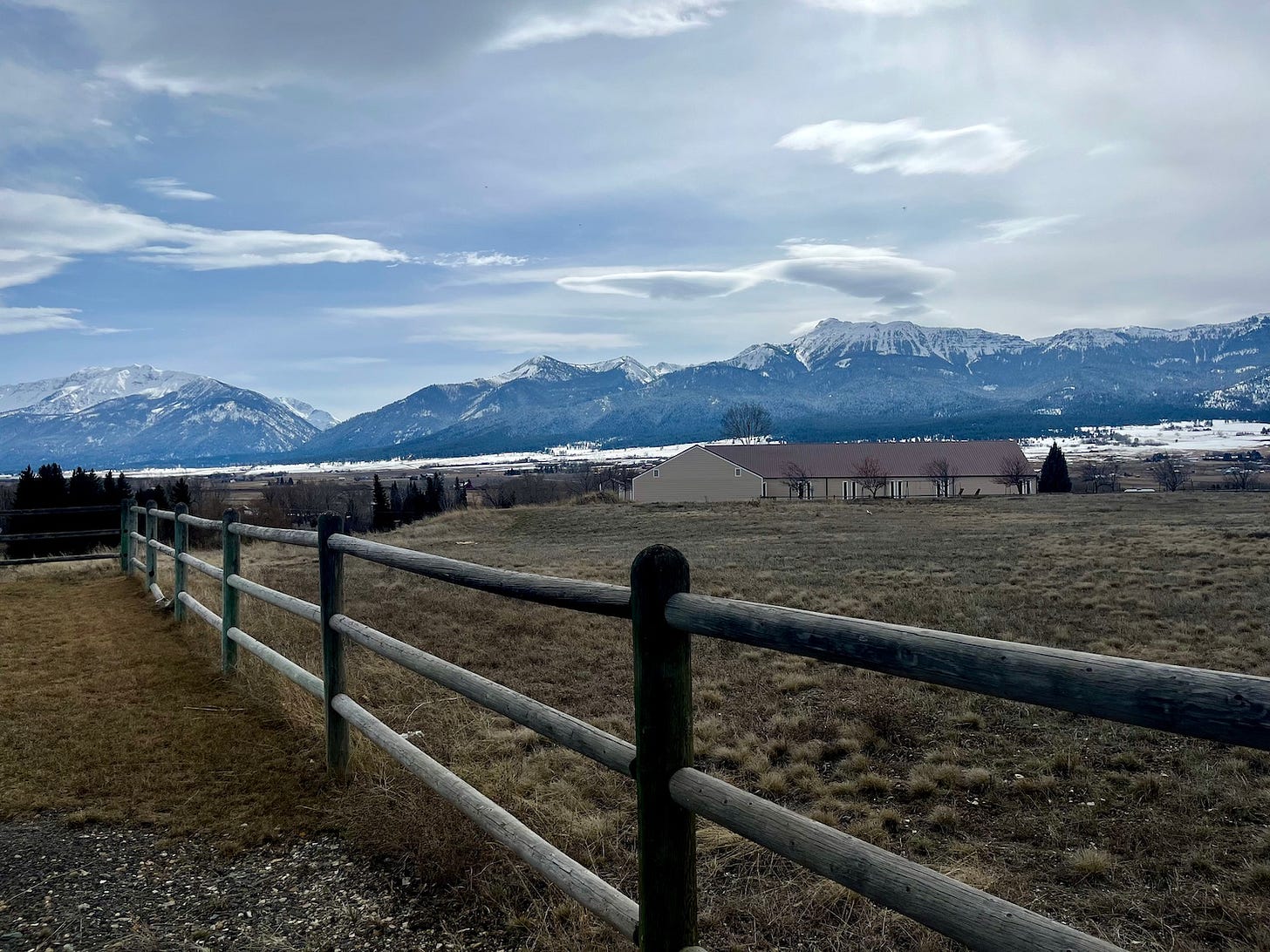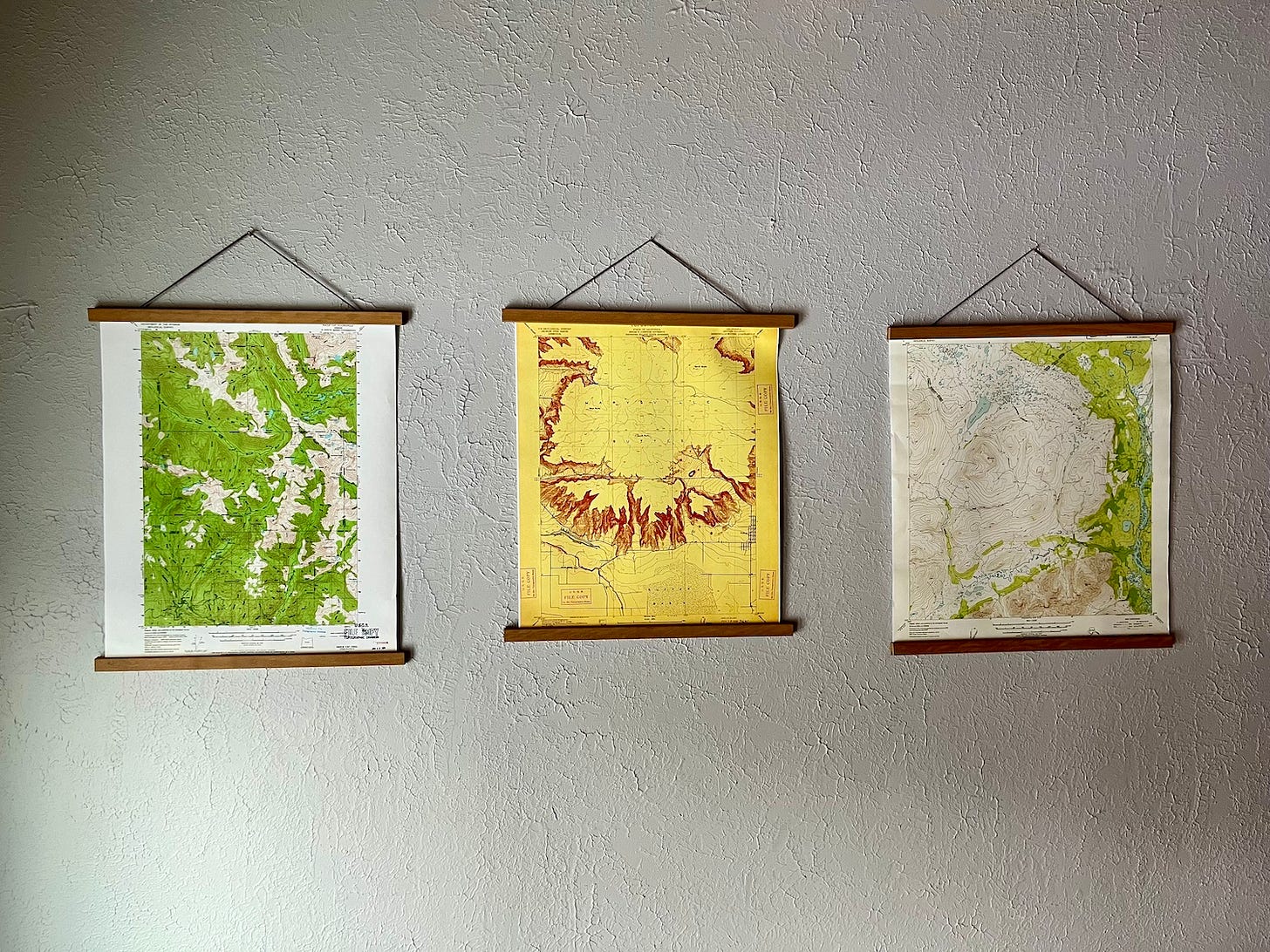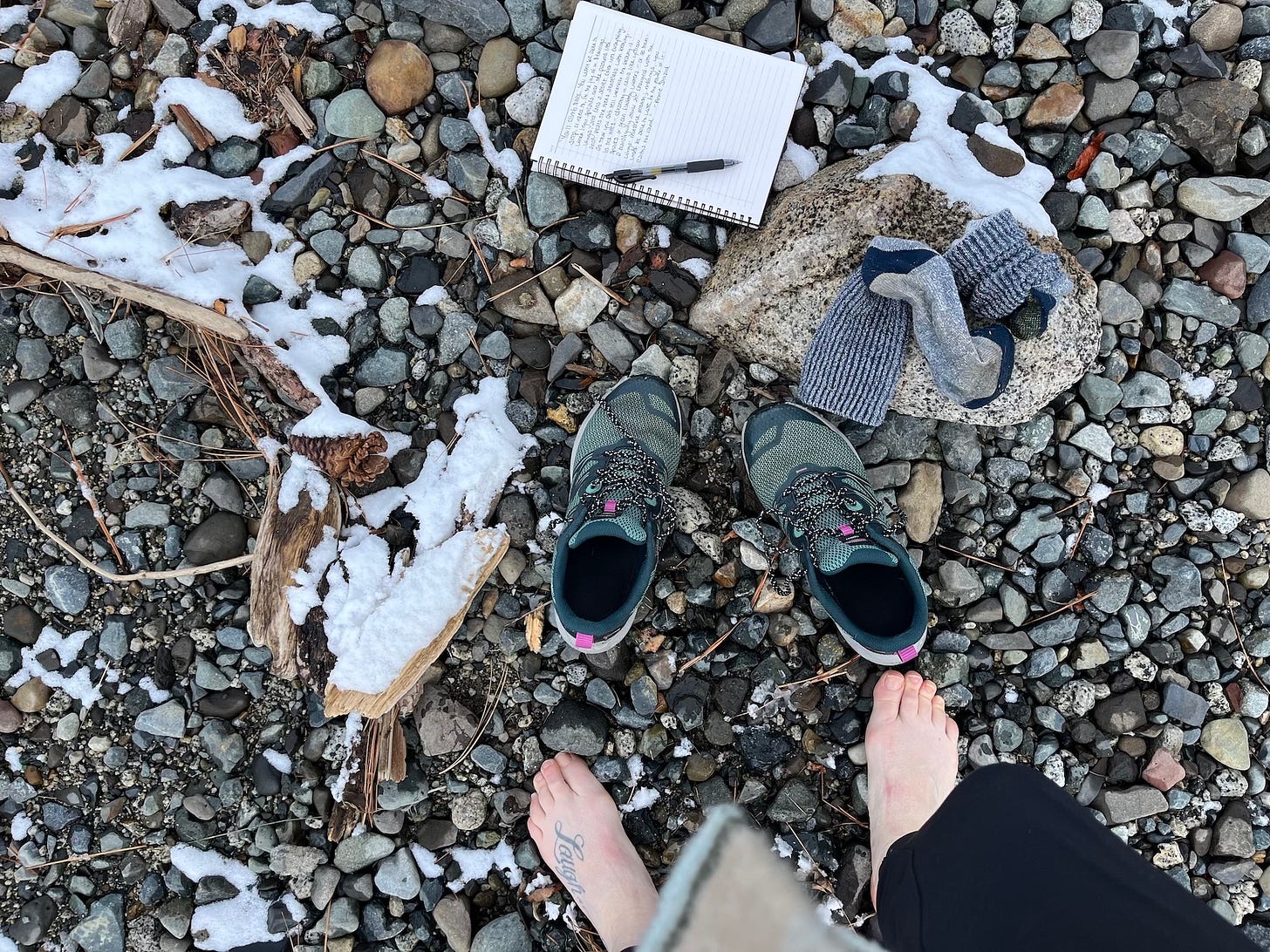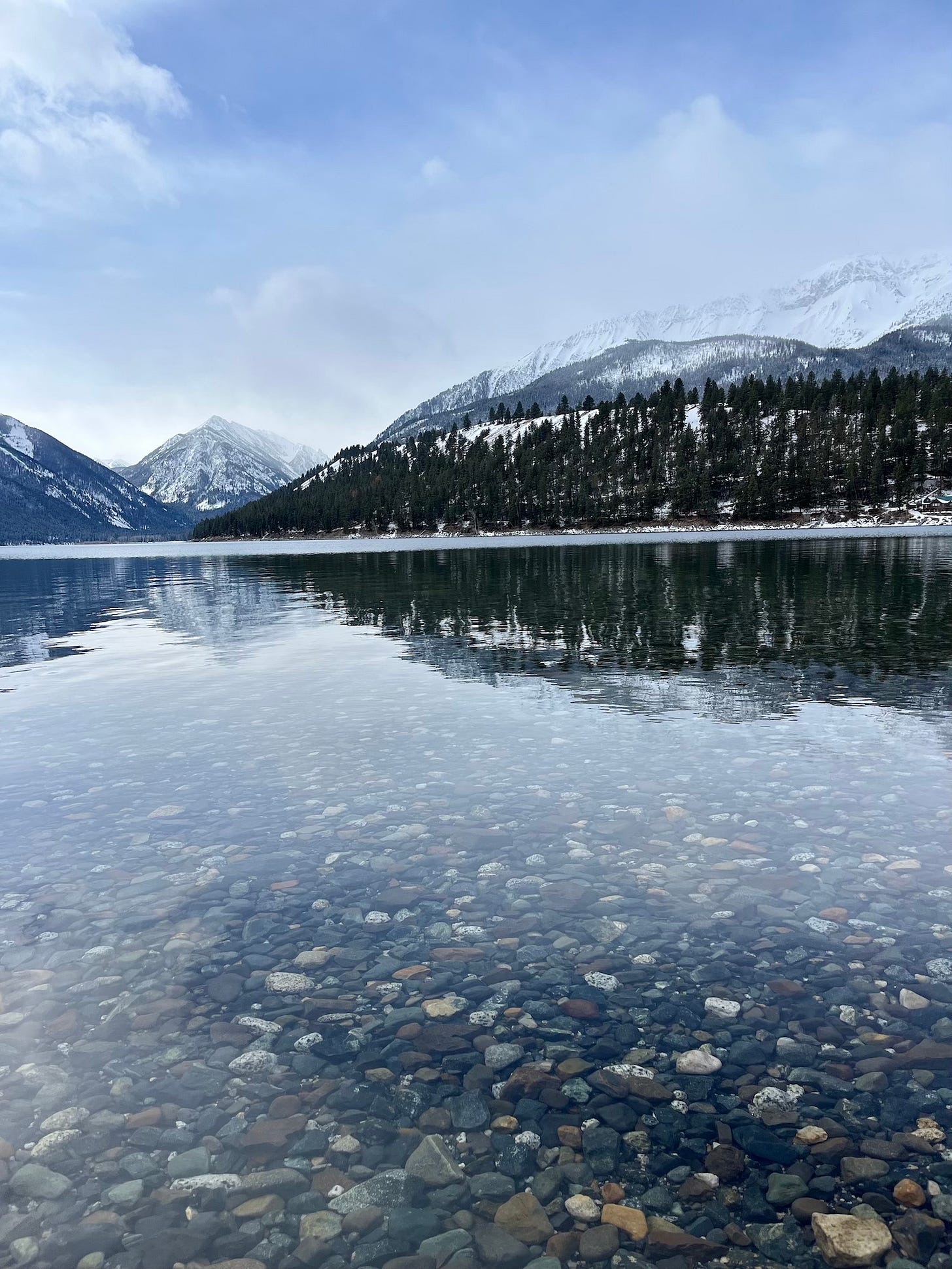How Not to Visit The Wallowas
An emotionally messy approach
Hear someone talk about “the Alps of Oregon” not long after moving to Portland. Google it and commit a bunch of stock photos of snowcapped mountains and alpine lakes to memory. The Wallowas. Think about The Wallowas again and again. Take many road trips across the state and further on to Utah and New Mexico and all the way across the country three times over. Each time, consider a detour to The Wallowas and then decide at the last minute that it’s just a little too out of the way. Live in Portland for ten years. Never visit the Wallowas.
Move 3,000 miles away. Find a reason to come back to Oregon in March, just three months after moving, when no one knows if it's winter or spring. Rent a car in Portland and start driving east.
Don’t pack snowboots or a map.
Stop in the cowboy town of Pendleton for a night, home of the world-famous wool and the regionally famous rodeo. Talk to the guy mopping the lobby of your recently renovated motel who says this town isn’t what it used to be, not since they got rid of the movie theater and the bowling alley where he spent all his time when he was a kid. Then talk to an older woman in a bookstore who says the opposite: “There’s always something to do here!”
Decide with your friend that you will only have one drink at each establishment because you’re doing research for a guidebook and you need to visit a bunch of places. Wake up in the morning with a mild hangover and four places you can definitely recommend for good beer selection and friendly service. Say goodbye to your friend who is driving back to Portland. Buy a cold Jasmine tea at the Asian grocery store in town before hitting the road.
Next stop: The Wallowas!
Miss your daughter as soon as you sink into the silence of solo travel. Miss her so much. Stop at a rest stop and open an app on your phone that immediately assaults you with gut-wrenching photos of terrible things happening far away. Ache to hold your child, to keep her safe. She is the only one you can keep safe.
Feel bad for leaving. Feel bad for wanting this time away.
Where are you going again? That’s right. The Wallowas.
Start driving again. Start to worry about snow as roadside patches of white turn into piles and then deep snow on either side of the road climbs skyward. Keep driving through a snow tunnel, gripping the steering wheel hard as the road climbs up and ice crawls into your lane, pushing you across the center line. Remember, then, that you always bring a map on road trips for this reason, because your phone compresses landscapes into these flat little directions that fail to mention the snow and the ice and the incline of the road you’re on for another 40 miles. A map would have given you a better idea with color coding and texture. Wonder if the walls of snow will close in before the curt, textureless directions on your phone get you out of here.
Pull over into gravel when the snow finally recedes. Send a friend a voice note telling her you just white-knuckled your way through a mountain pass and it felt like a Stephen King story and how’s her day going? Send it, then realize that you shouldn’t have sent it because minutes later, your service is gone and she’s definitely going to worry about you.
Take deep, slow breaths as the sky opens up and the road flattens and stretches into grassy ranchland. Spot the white squiggle of distant peaks against the steely sky. Wonder what your daughter is eating for lunch.
Don’t think about your daughter. Don’t think about the news. Just think about reaching your destination.
Pull into Joseph, a town you’ve heard so much about. You’ve heard it’s artsy and surprisingly progressive for a remote Eastern Oregon town. You’ve heard it’s the “gateway” to all the hiking and backpacking that people come here for, and that in the summertime it’s packed with people. But you’re here in the off-season, and it’s a weekday. So nobody really looks like a tourist besides you, and most of the shops are closed.

Let the mountains mesmerize you while you drive across town. Wonder how people can be going about their errands or yawning at a red light with these vanilla-soft-serve peaks pressed into the sky just beyond the roofs of Main Street. Yearn to reach out and touch them. Imagine leaping from one frozen dairy summit to the next, landing softly like some kind of mythical mountain fairy. Remember that you don’t even have snow boots.
Talk to the innkeeper at Kokanee Inn, where you’re the only guest for the night. Listen to her stories about snowshoeing to cabins she takes care of in the winter, and the backpacking she does in the summer. Remember the photos of alpine lakes that you dreamed of visiting. Tell her you’re thinking about taking the long way south to see Hell’s Canyon, the deepest canyon in the U.S. (Yes, deeper than the Grand!) She chuckles and tells you that whole road is socked in with snow this time of year. You definitely can’t go that way. (Curse your phone’s directions for making it look like a simple squiggly line of driving.)
Wish you’d come in the summertime. Wish you’d come during any of those summers when you had hardly any responsibilities and you only lived five hours away. Feel like these places and opportunities are dripping through your fingers in the barely thawing spring. Wonder if you’ll ever return.
Listen to her tell you how much this town has changed since people started seeing pictures of the mountains on Instagram; this inn will be booked solid all summer. Consider booking your room again this summer, which is just a few months away. Or, wait, the suite with the bunk beds your daughter could climb all over. Your husband would love this place, too. Maybe next summer? When she’s a little bigger and can hike a little further on her own? Wish you could come here again and again and get to know it like the innkeeper.
Realize you will never know this place like the innkeeper. Wish you could be the kind of person who knows a place like this town and the curves and bends of the land tucked into the mountains you can’t get to. Wish you were a person who knows the beauty and the challenges of the different seasons, the way someone might know the most intense moods of their soul mate.
Feel sad because perhaps you’ve never known a place so well. Perhaps you never will.
Walk to the arts center, which is about to close. “You just made it!” says a woman with long gray hair and twinkly eyes. She tells you to take your time, but you look at the table of books by local artists quickly and grab one. Tell her, “I don’t want to keep you! I’ll come back tomorrow!”
Spot a man coming down the stairs who is saying something about closing up before he sees you. Smile back when he smiles at you. Start talking to both of them about why you’re there, about what you’re writing. Feel the words spill out of you, surprising yourself with an eagerness to talk.
They tell you a poet is giving a reading in the next town over tonight. They tell you to come by. Say you will, but you aren’t sure. Walk quickly back to the inn to grab your car and go to the reading.
Listen to the poet talk about places in this region, painting scenes you’ve driven by with words that curl around details that crawl across your skin like a cool breeze. Listen to her words that bring it all to life in ways that all the photos on your phone never will. Decide that you must learn the names of more grasses and trees so you can write like this.
Drive back to the inn. Consider reading the poet’s book you bought at the reading, but decide to watch reality TV instead. Your brain is craving nonsense.
In the morning, wake early to do some writing. Wonder if your words will ever crawl across skin like a breeze on someone else’s arms, like the poet did for you.
Drive to Wallowa Lake, just a couple miles past your inn. Stare at a reflection of the mountains on the glassy water and cry a little because you looked at the news again, and everything is so big and unsolvable. Take off your shoes and then your socks. Pad across cold little rocks, some of them wearing a little bonnet of snow. Touch your toes to the snow. Feel the sharp cold. Step into the water. Let the cold hurt until it doesn’t and then it does again. Go deeper, up to your calves. Laugh at the ache and run back to the rocks.
Dry yourself off with your socks and pull them back on, then your shoes. Sit down. Open your notebook and start writing again. Write something vivid that feels good and true. Consider that perhaps you travel, hoping to feel the warmth of familiarity in new places. Perhaps you’ve never been looking for new places so much as you’ve been looking to imagine different versions of your life that might exist in another universe, and the swirl of excitement and sadness that makes you feel. Ask yourself: Does everyone travel with this yearning to find home everywhere?
Ask yourself: Why must there be so much distance between all the people and places I love? Could love?
Tell yourself: The ache that lives in that distance is worth sitting in sometimes. Worth crossing, others.
Go back to the inn. Change your socks. Pack your bag. Find an open coffee shop in town. Sit down with a latte. Text your husband and look at photos of your daughter. Miss home. (Which home? Does it matter?) Touch her cheek on your screen.
Crack open the poet’s book. Start to read about the high desert south of here and imagine the smell of sagebrush and the sound of all the songbirds you don’t know yet. Walk out of the coffee shop and smell the misty mountain air. Get back in your car and keep driving.
Thanks so much for reading and for supporting Wild Writing! I’m on the road for one more week on a guidebook writing assignment in Oregon, and my schedule is PACKED. I’m going to try to update at least once more in that time. But I won’t be on the usual Tuesday and Thursday publishing schedule. We’ll get back to that in April!
Stay inspired,
Britany







Thank you for sharing this wonderful, relatable snippet of your adventure.